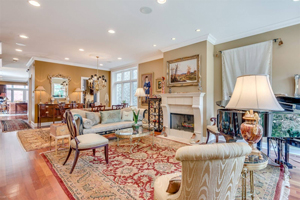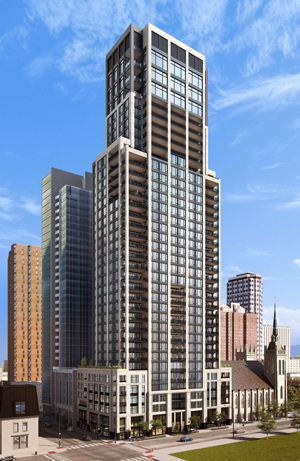About two years ago, Baird & Warner luxury broker Jim Kinney was representing a couple from New York who bought a co-op in Chicago for $4.1 million and paid about $1 million for a gut rehab. As the couple looked to sell, Kinney suggested caution.
“I told them, ‘In this market, you’ll be lucky to get out what you paid for it,’” said Kinney, a 40-year veteran who now trains younger agents. The couple listed the home for $6.4 million, and they found a different broker.
Today, the co-op remains on the market, though Kinney wouldn’t say in which neighborhood. It’s listed around $4.9 million.
The broker’s cautionary tale fits a broader trend bearing out in citywide luxury home sale data, which show prices peaked around 2015 and have been skidding ever since.

1748 West Wellington Avenue (Credit: Sotheby’s)
A July report by Re/Max on home sales above $1 million pegged the city’s median price around $1.3 million during the second quarter, an 8 percent decline from three years ago and the lowest point since 2012.
Brokers have different theories about what might have happened in 2015 to reverse luxury home sales while the wider market was heating up. Jenny Ames, one of the city’s top brokers by sales volume who works under the Coldwell Banker banner, pointed to that year’s record-breaking property tax hike as a potential culprit.
The annual tax burden rocketed from $21,000 to $31,000 on one of Ames’ client’s homes, a single-family house in Lincoln Park, between 2014 and this year, she said.
“It may have been OK if it had fixed the city’s problems, but it didn’t,” Ames said. “Now we’re still talking about more property tax increases, so if you’re sitting here with a substantial home, you’re thinking ‘Hmm, maybe I shouldn’t sit on this for much longer.’”
Kinney also pointed to state lawmakers’ failure to pass a budget between 2015 and 2017 as a turning point for buyer confidence. He added that the possibility of a Democratic governor next year pushing a graduated income tax has spooked some wealthier residents.
“The exodus is palpable,” Kinney said. “People with money are leaving Illinois about as fast as they can.”
But the sagging prices overlap a steady upward march in the total number of transactions, driven in part by luxury condos Downtown. The city notched 457 luxury home sales between April and June this year, up from 200 in 2012 and 338 in 2015, according to the Re/Max report.
The losers in that equation are the older high-end homes now being outshined by palatial new construction like the condo tower at 9 West Walton Street, where billionaire Ken Griffin smashed records with his $59 million purchase of a penthouse condo late last year.

No 9 Walton at 9 West Walton Street (Credit: JDL Development)
“Those people who don’t want to leave Illinois are only going to pay for the newest, nicest home on the block,” Kinney said. “So a 9 West Walton will survive, but once you get to something that’s three to five years old, these millennials are going to come in and say everything has to be redone, or they won’t buy it.”
Agents with Re/Max Premiere, the brokerage’s luxury sales wing based in the Gold Coast, have had to tamp down luxury sellers’ expectations in the past few years to accommodate an increasingly demanding crop of buyers.
“A lot of times the seller doesn’t want to hear it, but if they have a mosaic marble design from 10 or even five years ago, it’s going to have to be completely redone to something that’s fashionable today,” Re/Max Premiere CEO Janice Corley. said “For those kinds of homes, if they don’t upgrade, the buyer is going to want a very, very good price.”
Luxury home sales haven’t been flagging everywhere in the city. Single-family home sales above $1 million in Lincoln Park, Lakeview and West Town have been steadily climbing in both median price and volume since 2012, according to the report.
Condos in the Loop, however, appear to be having a harder time on the market. The Re/Max report showed a 23 percent crash in the neighborhood’s luxury attached home prices between 2015 and 2018.
Corley blamed the recent surge in construction of ultra high-end apartments, which held a tiny piece of the market just a few years ago but now are luring Downtown-bound empty nesters away from buying.
“I know some clients who would rather pay $5 or 6,000 a month on a luxury rental than to put 35 percent down on a $1.5 million condo, because it has enough services that they feel like they own the place,” Corley said. “Five years ago, you just couldn’t find an apartment like that.”
The shift toward rentals is also part of a broader, less tangible trend that Corley and Ames both said has begun to weigh on the luxury market: People are just less willing to see big homes as a solid investment.
“People are more transitory … The idea used to be that you’d buy your forever home and raise your grandchildren there, and we’re just not in that place anymore,” Ames said. “So it’s not necessarily attractive anymore to be thinking about that huge place, and it’s making sense to downsize sooner than it used to.”
